Mercedes-AMG GT vs Porsche 911 Turbo vs BMW i8
Mercedes-AMG GT vs Porsche 911 Turbo vs BMW i8
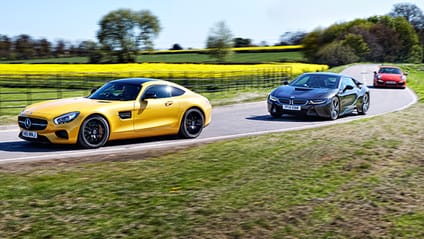

For £1,795, you can have your AMG GT with the Dynamic Plus package. Have it. Not because of the dynamic engine and transmission mounts or the ‘specifically tuned' suspension that's included, but because it comes with an Alcantara (OK, Dinamica microfibre) steering wheel. Just the thing for soaking up those sweaty-palm moments. Which, as you might already have gathered, the GT is pretty adept at delivering.
It did so in the Pennines, and now it's pretty busy doing so in the Lincolnshire Wolds. Sometimes you just wish the AMG GT would settle down a bit, stop being so fractious.
Maybe it's upset by our reception committee, or maybe by the fact it's not leading right now (you get the impression that the GT likes to be in charge and gets grumpy when it isn't). Instead it's at the back of the line, forced to stare at the plump, rounded haunches of the 911 Turbo up front and skinny little tyres of the wingleted i8.
Pictures: John Wycherley
ADVERTISEMENT - PAGE CONTINUES BELOW
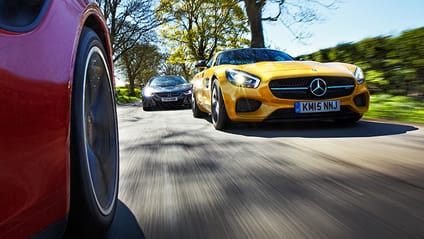
That i8 is really not the Merc's cup of tea. Pretty much the polar opposite, in fact. Where the AMG is all noise and drama, the BMW is glide and sophistication. But as we've found on every occasion, you should never underestimate the i8's ability to amaze you - both as an object of desirability and as a driver's car.
The 911 Turbo is the link pin between the two extremes. It has the twin-turbo impact of the AMG, but the four-seat cabin and four-wheel-drive security of the BMW. That's probably forcing the issue a bit - the Porsche is more aligned with the Mercedes, a 513bhp motor designed specifically to get itself down a road as efficiently and rapidly as physics permits. As far as price, performance and capability go, this is the benchmark Mercedes must have had in mind.
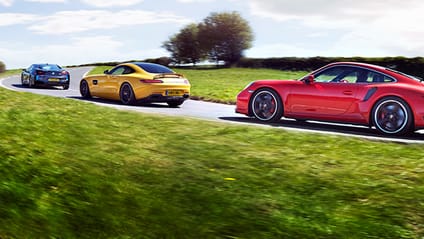
At least as far as the metric data goes. It's not like the chassis templates have much in common: front-engined two-seater plays rear-engined four-seater, the Merc channelling SLS leftovers; the 911, 50 years of heritage. The BMW is different - intoxicatingly so. Carbon-fibre tub chassis, the guts to downsize to a genuinely small engine, radical aero, even an acceptance that cornering speeds don't need to be so high.
And they aren't. The BMW puts roughly a third less rubber on the road and, if you are pushing on, it's around 10mph slower through any given corner. It also has the most over-protective traction control, but drop that back a notch, remind yourself that last-gasp braking efforts followed by abrupt bungs at the apex will only result in quickly overheated discs and unsatisfying understeer, and you're set for a good time. No, a great time.
ADVERTISEMENT - PAGE CONTINUES BELOW
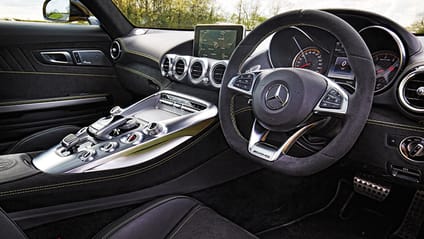
You have to accept that you can't do the lead-foot, scruff-of-the-neck stuff with the i8. Some adaptation is required. You have to work to the lower limits, feed, thread and soothe it through corners. Do so and you soon realise you are covering ground at a fair old lick - it conserves momentum so, so well, the i8. And all the time, you have this fascinating powerplant pushing you along, instant electric shove and artificially-enhanced three-cylinder top notes.
The noise. It doesn't offend me so much now. Maybe I've got used to its warming thrum, but it's on a par for volume and aural appeal with the whooshiness of the 911 Turbo, which only hardens into something more angry right at the far end of the dial. The Merc is on a different level altogether. It's as if the exhaust somehow bypasses the muffling effect of the turbos completely. This is hedonistic, expansive stuff, a bellowing V8 that hasn't lost its mojo at all.

It's also fiercely responsive in a way the 911 can't match. The Porsche takes longer to gird its loins, to summon up the sinews, so, given an overtaking opportunity, the Merc will pull out the hard yards first and do so with more passion and drama, nose lifting up, rear wheels tucking themselves deep into the arches. The Porsche is quicker on paper - of course it is, it's four-wheel drive - but out here, on real, normal roads, GT and Turbo trade equally savage blows.
But here's the surprise - the i8 isn't often left behind. That same overtaking opportunity? The BMW will nail the deal first, the revless, gearless e-motor providing an instant zap of peak torque that delivers a snap to your neck better than either rival. OK, given more space - the sort of dead straight, treeless roads we eventually find out in the Fens (if Tron did agriculture...) - the i8 will start to lag. But how fast do you need to go when you're dealing with 60mph speed limits?

However fast it is, the Merc wants to be going faster. This is an angry car. You get the impression that Mercedes could have made it a direct 911 rival and then thought, "No, let's make it more hardcore." So the actual feel and tightness of the car, it's more GT3 than Turbo. But that doesn't mean it's better to drive than the Porsche. Because it isn't.
The Porsche is devastating, reassuring, digs itself deep into corners and comes rocketing out the far side. It's a weapon. A missile. It's not the last word in tactility and feedback (although it still has the best steering of these three), but it's so stable and effective and so rarely puts a foot wrong that you can't help but just nod sagely in admiration and disbelief at what it's just done to a difficult piece of road.
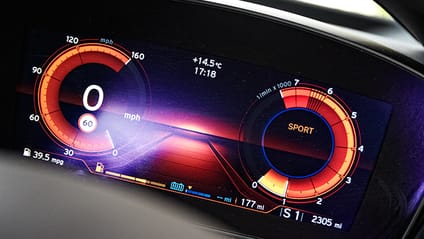
Not the Merc. This is a man's car - and I do mean that in the full Yorkie bar sense of the word. It would call you a wuss if it could, the AMG GT. I have no doubt it would be utterly blistering around a smooth race track - it was at Dunsfold on the TV show - but on a bumpy road? Not so much. I fiddled endlessly with the plethora of settings, and finally settled on having everything toughened up as much as possible. Slacken the dampers and you introduce a bit of pitch, heave and jiggle; tighten them and you don't make the ride any worse, but you do stop all the masses moving about.
It's a snatchy, fighty car. Drive fast and you need to have your wits about you - the margin for error is small. I'm sure some people will like this, will like to boast that they own a car that'll put hairs on your chest, and I'm equally sure Mercedes engineered it to be like this. But it's too much, especially when the steering is overly light and insensitive around the straight ahead, and then whips into corners if you put a touch more lock on. It's unsettling, unrelaxing, hard to trust. Yes, it's exciting, but not in all the right ways.
ADVERTISEMENT - PAGE CONTINUES BELOW
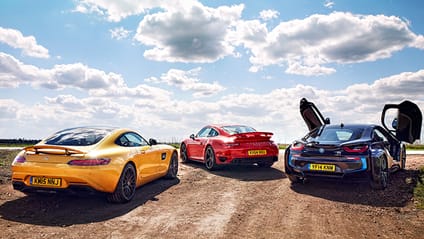
These are three very disparate cars, and you could construct an argument for any of them to win. But despite that, despite the fact I usually have a deep and abiding love of beefy rear-drive AMGs, the GT finishes last. The other two are harder to separate, but in all honesty, if the god of road tests descended and told me I could drive away in one, it'd be the i8. I can't tell you how much it surprises me to be putting a petrol-electric ahead of an AMG and a 911, but the BMW is not just a sporty hybrid, it's a car that's enthralling and mesmerising on so many levels.


For £1,795, you can have your AMG GT with the Dynamic Plus package. Have it. Not because of the dynamic engine and transmission mounts or the ‘specifically tuned' suspension that's included, but because it comes with an Alcantara (OK, Dinamica microfibre) steering wheel. Just the thing for soaking up those sweaty-palm moments. Which, as you might already have gathered, the GT is pretty adept at delivering.
It did so in the Pennines, and now it's pretty busy doing so in the Lincolnshire Wolds. Sometimes you just wish the AMG GT would settle down a bit, stop being so fractious.
Maybe it's upset by our reception committee, or maybe by the fact it's not leading right now (you get the impression that the GT likes to be in charge and gets grumpy when it isn't). Instead it's at the back of the line, forced to stare at the plump, rounded haunches of the 911 Turbo up front and skinny little tyres of the wingleted i8.
Pictures: John Wycherley
ADVERTISEMENT - PAGE CONTINUES BELOW

That i8 is really not the Merc's cup of tea. Pretty much the polar opposite, in fact. Where the AMG is all noise and drama, the BMW is glide and sophistication. But as we've found on every occasion, you should never underestimate the i8's ability to amaze you - both as an object of desirability and as a driver's car.
The 911 Turbo is the link pin between the two extremes. It has the twin-turbo impact of the AMG, but the four-seat cabin and four-wheel-drive security of the BMW. That's probably forcing the issue a bit - the Porsche is more aligned with the Mercedes, a 513bhp motor designed specifically to get itself down a road as efficiently and rapidly as physics permits. As far as price, performance and capability go, this is the benchmark Mercedes must have had in mind.

At least as far as the metric data goes. It's not like the chassis templates have much in common: front-engined two-seater plays rear-engined four-seater, the Merc channelling SLS leftovers; the 911, 50 years of heritage. The BMW is different - intoxicatingly so. Carbon-fibre tub chassis, the guts to downsize to a genuinely small engine, radical aero, even an acceptance that cornering speeds don't need to be so high.
And they aren't. The BMW puts roughly a third less rubber on the road and, if you are pushing on, it's around 10mph slower through any given corner. It also has the most over-protective traction control, but drop that back a notch, remind yourself that last-gasp braking efforts followed by abrupt bungs at the apex will only result in quickly overheated discs and unsatisfying understeer, and you're set for a good time. No, a great time.
ADVERTISEMENT - PAGE CONTINUES BELOW

You have to accept that you can't do the lead-foot, scruff-of-the-neck stuff with the i8. Some adaptation is required. You have to work to the lower limits, feed, thread and soothe it through corners. Do so and you soon realise you are covering ground at a fair old lick - it conserves momentum so, so well, the i8. And all the time, you have this fascinating powerplant pushing you along, instant electric shove and artificially-enhanced three-cylinder top notes.
The noise. It doesn't offend me so much now. Maybe I've got used to its warming thrum, but it's on a par for volume and aural appeal with the whooshiness of the 911 Turbo, which only hardens into something more angry right at the far end of the dial. The Merc is on a different level altogether. It's as if the exhaust somehow bypasses the muffling effect of the turbos completely. This is hedonistic, expansive stuff, a bellowing V8 that hasn't lost its mojo at all.

It's also fiercely responsive in a way the 911 can't match. The Porsche takes longer to gird its loins, to summon up the sinews, so, given an overtaking opportunity, the Merc will pull out the hard yards first and do so with more passion and drama, nose lifting up, rear wheels tucking themselves deep into the arches. The Porsche is quicker on paper - of course it is, it's four-wheel drive - but out here, on real, normal roads, GT and Turbo trade equally savage blows.
But here's the surprise - the i8 isn't often left behind. That same overtaking opportunity? The BMW will nail the deal first, the revless, gearless e-motor providing an instant zap of peak torque that delivers a snap to your neck better than either rival. OK, given more space - the sort of dead straight, treeless roads we eventually find out in the Fens (if Tron did agriculture...) - the i8 will start to lag. But how fast do you need to go when you're dealing with 60mph speed limits?

However fast it is, the Merc wants to be going faster. This is an angry car. You get the impression that Mercedes could have made it a direct 911 rival and then thought, "No, let's make it more hardcore." So the actual feel and tightness of the car, it's more GT3 than Turbo. But that doesn't mean it's better to drive than the Porsche. Because it isn't.
The Porsche is devastating, reassuring, digs itself deep into corners and comes rocketing out the far side. It's a weapon. A missile. It's not the last word in tactility and feedback (although it still has the best steering of these three), but it's so stable and effective and so rarely puts a foot wrong that you can't help but just nod sagely in admiration and disbelief at what it's just done to a difficult piece of road.

Not the Merc. This is a man's car - and I do mean that in the full Yorkie bar sense of the word. It would call you a wuss if it could, the AMG GT. I have no doubt it would be utterly blistering around a smooth race track - it was at Dunsfold on the TV show - but on a bumpy road? Not so much. I fiddled endlessly with the plethora of settings, and finally settled on having everything toughened up as much as possible. Slacken the dampers and you introduce a bit of pitch, heave and jiggle; tighten them and you don't make the ride any worse, but you do stop all the masses moving about.
It's a snatchy, fighty car. Drive fast and you need to have your wits about you - the margin for error is small. I'm sure some people will like this, will like to boast that they own a car that'll put hairs on your chest, and I'm equally sure Mercedes engineered it to be like this. But it's too much, especially when the steering is overly light and insensitive around the straight ahead, and then whips into corners if you put a touch more lock on. It's unsettling, unrelaxing, hard to trust. Yes, it's exciting, but not in all the right ways.
ADVERTISEMENT - PAGE CONTINUES BELOW

These are three very disparate cars, and you could construct an argument for any of them to win. But despite that, despite the fact I usually have a deep and abiding love of beefy rear-drive AMGs, the GT finishes last. The other two are harder to separate, but in all honesty, if the god of road tests descended and told me I could drive away in one, it'd be the i8. I can't tell you how much it surprises me to be putting a petrol-electric ahead of an AMG and a 911, but the BMW is not just a sporty hybrid, it's a car that's enthralling and mesmerising on so many levels.
Comments
Post a Comment